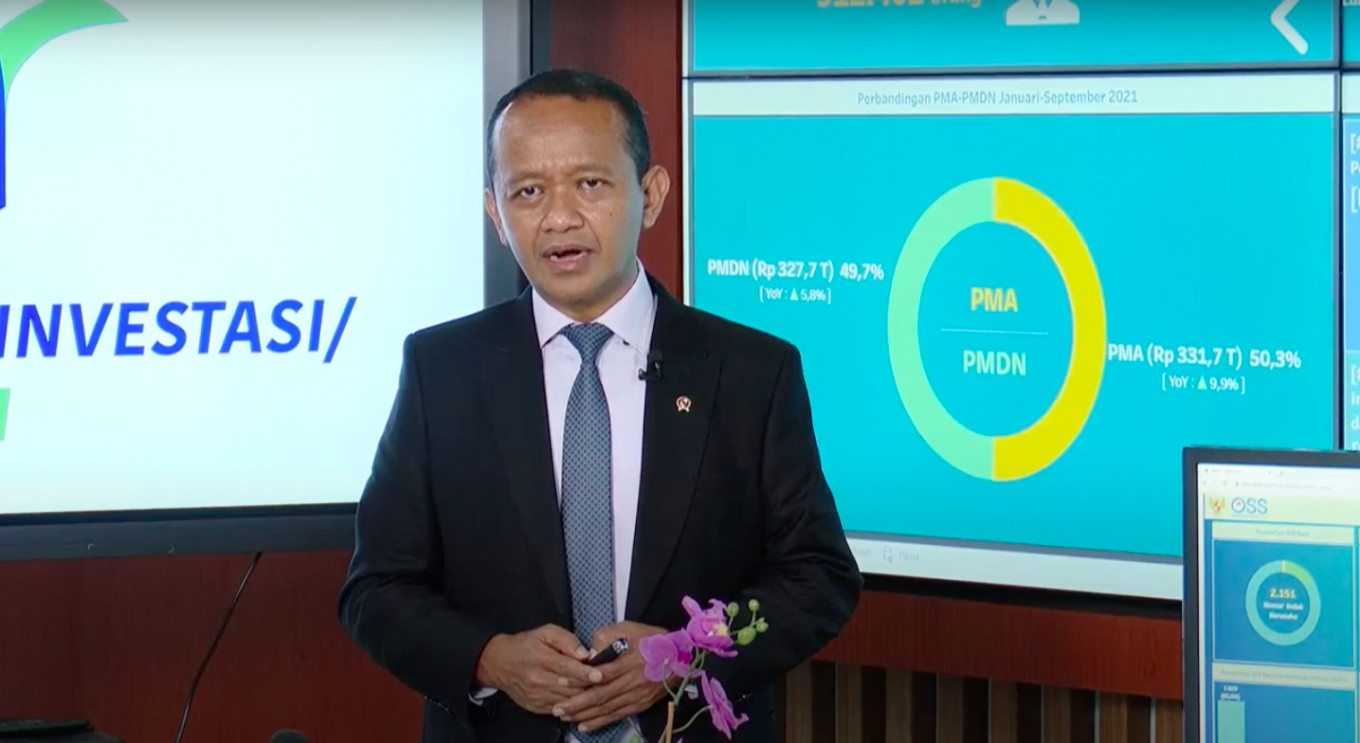Popular Reads
Top Results
Can't find what you're looking for?
View all search resultsPopular Reads
Top Results
Can't find what you're looking for?
View all search resultsIndonesian ministries clash over clean power export plan
Indonesia's Investment Ministry has called for a ban on export of electricity generated from renewable energy sources after the Energy and Mineral Resources Ministry signed a deal with Singapore to deliver solar power to the city state.
Change text size
Gift Premium Articles
to Anyone
G
overnment officials have raised questions over a proposed ban on new and renewable energy (EBT) exports, arguing such a move could discourage investment.
Deputy Coordinating Economic Affairs Minister Edi Prio Pambudi said that even though meeting domestic demand for clean power was important, EBT development was impossible without foreign investment, which required “concessions” in the form of allowing energy trade.
“[We need to discuss] whether foreigners are willing to invest [if the project is] only for domestic demand, and how foreign supplies are considered. I believe that the idea [of an EBT electricity export ban] needs further discussion,” Edi told The Jakarta Post on Monday.
Last month, the Investment Ministry called for a ban on the export of electricity generated from new and renewable energy (EBT) sources, raising questions over plans for export-focused renewable energy projects, such as the export of solar power from Batam to Singapore.
Investment Minister Bahlil Lahadalia floated the idea during an investment forum in Surakarta on May 18, where he explained that, if domestic EBT electricity was exported, related industrial growth would be redirected to the importing countries.
"Go ahead if you want to invest, but we have not thought about exporting EBT to any country, because we will use it domestically first. […] Because, if we sell the electricity to other countries, the industrial [development] will run there [instead]," Bahlil contended.
Read also: Indonesia looks to ASEAN to offload excess electricity
Bahlil reiterated the idea of an export ban during the World Economic Forum (WEF) Annual Meeting in Davos, Switzerland, on May 24, where he claimed President Joko “Jokowi” Widodo supported his idea.
"Regarding the electricity export ban, we will soon create the regulation, because it has been decided in a meeting with President Jokowi," Bahlil said.
At the same event, Bahlil explained that the idea to ban EBT electricity exports had emerged as he accompanied the President to the ASEAN-US Special Summit in Washington, D.C., earlier that month.
When asked about Indonesia’s cooperation with foreign businesses in EBT development, Bahlil said there would be an “evaluation” and noted that no export permits had been issued yet.
“For a while, we were still searching [for the right policy]. So, when I accompanied the President during the ASEAN-US [Special] Summit, our crazy ideas as a government emerged. [We are] finally able to guess the direction of [our] policy. We have to protect our country," Bahlil continued.
Bahlil's latest comments on EBT exports were floored during the joint press conference with Singaporean Trade and Industry Minister Gan Kim Yong on May 30, where both countries committed themselves to further talks on the issue.
"Regarding electricity imports, I know that Minister [Bahlil] has some objections to our electricity import [request], but we can find a win-win solution to this," Yong was quoted as saying in a press statement from the Investment Ministry.
On Jan. 26, the Energy and Mineral Resources Ministry signed a memorandum of understanding (MoU) with the Singaporean Trade and Industry Ministry on renewable energy development, including energy trading and project financing.
When asked by The Jakarta Post whether EBT electricity exports were not necessary so as to create an incentive for investment in renewables, the energy ministry’s EBT Director General Dadan Kusdiana agreed that that sounded “logical.”
“There are considerations as to how Indonesia can maintain its competitiveness vis-à-vis other countries," Dadan told reporters on Monday.
Rida Mulyana, the energy ministry’s electricity director general, said the issue of EBT electricity exports was the remit of economic decision-makers.
“We do the implementation, but as for policy, energy is not the only [consideration]. This is an economic issue,” Rida told reporters on Monday.
Read also: Phase out fossil fuel-fired electricity, embrace biomass energy
Indonesian Chamber of Commerce and Industry (Kadin) deputy chairperson for investment Shinta Widjaja Kamdani said any excess EBT electricity on the domestic market should be exported to develop the EBT industry.
She argued that investment in EBT had lower financial viability than the non-EBT sector, as unending subsidies in maintaining domestic energy supply made it difficult for EBT businesses to grow.
"If the export of EBT electricity can create greater economies of scale for EBT supply and nurture competitive financial viability for EBT investment, we feel that the government needs to evaluate this policy [the ban]," she said in a written message to The Jakarta Post on Monday.
Institute of Essential Services Reform (IESR) director Fabby Tumiwa said concerns about competing with Singapore for investment could be Bahlil's primary reasoning for the EBT electricity export ban.
“By [supplying] Singapore [with EBT electricity] and increasing their investment attractiveness, we will lose [in investment competitiveness],” Fabby said in a phone call with the Post, explaining that keeping the EBT electricity in the domestic market could raise Indonesia’s appeal for investors.
Fabby said the way the plan was announced could create uncertainty for foreigners.
“The export of electricity is allowed according to the Electricity Law, so no rules are broken. If the government really intends to prohibit it, then it needs a [proper] regulation with an explanation of the timeframe and conditions," he concluded.










